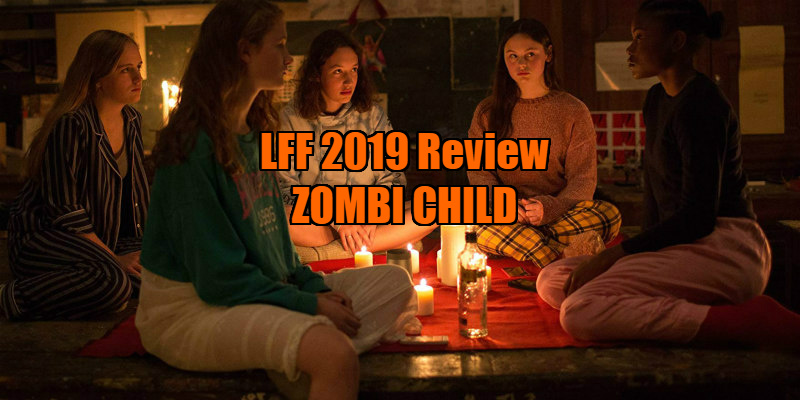
Review by Eric Hillis
Directed by: Bertrand Bonello
Starring: Louise Labeque, Wislanda Louimat, Katiana Milfort, Mackenson Bijou, Adilé David

The dominant image of the zombie in western culture comes from George A Romero's 1968 shocker Night of the Living Dead, arguably the most influential horror movie ever made. Over the decades since, zombies have evolved to controversially sprint rather than shamble, but the image of a bloodthirsty ghoul hasn't changed much from those found in Romero's film.
Long before NOTL, the zombie had a connection with real world mythology. In Haiti, voodoo practices were said to be employed to resurrect the dead as a source of slavery, with the living dead cruelly put to work in the island's cane fields. As far back as 1932's White Zombie, cinema began to explore this disturbing notion, but perhaps the best movie to date concerning the Haitian zombie is Jacques Tourneur's 1943 thriller I Walked with a Zombie. Once Romero's ghouls arrived, the original Haitian zombies were cast aside, with Wes Craven's 1988 The Serpent and the Rainbow the only major horror movie to mine the setting (unless you count Live and Let Die, whose villain, Baron Semedi, makes an appearance in the film we're discussing here). Now, French filmmaker Bertrand Bonello (Saint Laurent; Nocturama) delves into Haitian lore with his opaque horror-drama Zombi Child.

One popular Haitian folk tale is that of Clairvius Narcisse, who was zombified in 1962 and forced into slavery on a plantation while in a state somewhere between life and death. Bonello dramatises Narcisse's story with actor Bijou Mackenson in the role. Watching Narcisse make guttural wheezing noises as he works, as though half-remembering his ability to speak, and seeing him stare off into a distance that brings back memories he can no longer comprehend, is a raw and damning evocation of slavery. Summoning up what little free will he possesses, Narcisse shambles off the plantation, finding some degree of freedom rambling through the forests of Haiti.
[ READ MORE: London Film Festival 2019 Review - Ghost Town Anthology ]
In the present day, Narcisse's granddaughter Melissa (Wislanda Louimat) is newly enrolled at a prestigious French girls' boarding school. In such surroundings, Melissa is an outsider in several ways. She appears to be the only black pupil, and given her propensity for behaviour which her fellow classmates consider "weird", such as dancing without the aid of music, Melissa struggles to fit in.

Melissa is befriended by Fanny (Louise Labèque), who convinces her friends to allow Melissa to join their literary society, which like any good college society, appears to be an excuse for secret nocturnal drinking sessions. As the anniversary of her grandfather's zombification approaches, Melissa seems to channel his zombie spirit, and dreams of eating her classmates. While the other girls begin to distance themselves from Melissa, Fanny becomes increasingly obsessed with voodoo, and hopes to use the practice to win over the boy who has left her heartbroken.
[ READ MORE: London Film Festival 2019 Review - End of the Century ]
There's a commentary on French colonialism and cultural appropriation running through Bonello's film, but it never plays as sharp as I suspect the film intends. Through the character of Fanny we have a representation of how white westerners like to pick and choose elements of alien cultures. Her obsession with voodoo comes across like a fad, as if she's a soccer mom who just got really into Buena Vista Social Club because their music makes a great backdrop for dinner parties. She approaches Melissa's aunt (Katiana Milfort), a 'Mambo' priestess, with her silly request to have her lover's soul mingled with her own, eventually bullying the Haitian woman into granting her wish.

This could be considered satire, but Bonello plays it all too straight, much to the detriment of the film and the point he's trying to make. Lose the Haitian element and you're ironically left with a more interesting parable on how the education system exercises its own form of zombification, breaking the free spirits of young people and turning them into zombies ready to take their place in the cane fields of European society. As depicted here, the school rivals the ballet academy of Suspiria for creepiness, with the girls bizarrely forced to bow backwards when greeted by a member of the faculty. The school's founder, Napoleon, is still spoken of in glowing terms, and the girls' upper class egos are stroked with talk of how simply being eligible to attend places them in the upper echelons of French society.
Zombi Child mixes up two movies to make one basic point, but there isn't quite enough meat on either subplot to sink your rotting teeth into. It's always watchable though, as Bonello is a skilled enough stylist for his moody visuals to make up for an absence of substance. Conjuring up arresting images with cinematographer Yves Cape, Bonello offers plenty of eye candy, but not nearly as much food for thought as this subject warrants.

Zombi Child plays at the BFI London Film Festival October 6th, 7th and 11th, and will be available to stream on MUBI from October 18th.
"While The King offers little new from a plot perspective, it does give us some fascinating period details usually overlooked by dramas of this ilk."— 𝕋𝕙𝕖𝕄𝕠𝕧𝕚𝕖𝕎𝕒𝕗𝕗𝕝𝕖𝕣.𝕔𝕠𝕞 🎬 (@themoviewaffler) September 29, 2019
THE KING is in UK/ROI cinemas October 11th and on Netflix November 1st.
Read @hilliseric's reviewhttps://t.co/NOz3booG9k pic.twitter.com/cVMeOwIrbg

